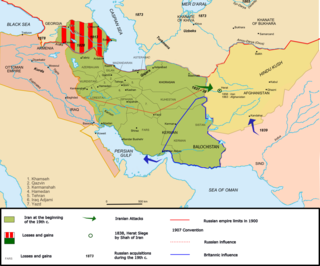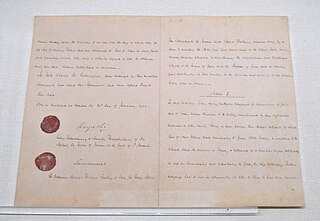Related Research Articles

The Pact of Steel, formally known as the Pact of Friendship and Alliance between Germany and Italy was a military and political alliance between Italy and Germany.

In the field of international relations, a sphere of influence (SOI) is a spatial region or concept division over which a state or organization has a level of cultural, economic, military, or political exclusivity.

The Triple Entente describes the informal understanding between the Russian Empire, the French Third Republic, and the United Kingdom of Great Britain and Ireland. It was built upon the Franco-Russian Alliance of 1894, the Entente Cordiale of 1904 between France and Britain, and the Anglo-Russian Entente of 1907. It formed a powerful counterweight to the Triple Alliance of the German Empire, the Austro-Hungarian Empire, and the Kingdom of Italy. The Triple Entente, unlike the Triple Alliance or the Franco-Russian Alliance itself, was not an alliance of mutual defence.

The Twenty-One Demands was a set of demands made during the First World War by the Empire of Japan under Prime Minister Ōkuma Shigenobu to the government of the Republic of China on 18 January 1915. The secret demands would greatly extend Japanese control of China. Japan would keep the former German areas it had conquered at the start of World War I in 1914 and would be strong in Manchuria and South Mongolia while having an expanded role in railways. The most extreme demands would give Japan a decisive voice in finance, policing, and government affairs. The last part would make China in effect a protectorate of Japan, and thereby reduce Western influence.

The Open Door Policy is the United States diplomatic policy established in the late 19th and early 20th century that called for a system of equal trade and investment and to guarantee the territorial integrity of Qing China. The policy was created in U.S. Secretary of State John Hay's Open Door Note, dated September 6, 1899, and circulated to the major European powers. In order to prevent the "carving of China like a melon", as they were doing in Africa, the Note asked the powers to keep China open to trade with all countries on an equal basis and called upon all powers, within their spheres of influence to refrain from interfering with any treaty port or any vested interest, to permit Chinese authorities to collect tariffs on an equal basis, and to show no favors to their own nationals in the matter of harbor dues or railroad charges. The policy was accepted only grudgingly, if at all, by the major powers, and it had no legal standing or enforcement mechanism. In July 1900, as the powers contemplated intervention to put down the violently anti-foreign Boxer uprising, Hay circulated a Second Open Door Note affirming the principles. Over the next decades, American policy-makers and national figures continued to refer to the Open Door Policy as a basic doctrine, and Chinese diplomats appealed to it as they sought American support, but critics pointed out that the policy had little practical effect.

The Anglo-Russian Convention of 1907, or Convention between the United Kingdom and Russia relating to Persia, Afghanistan, and Tibet, was signed on August 31, 1907, in Saint Petersburg. It ended the two powers' longstanding rivalry in Central Asia and enabled them to outflank the Germans, who were threatening to connect Berlin to Baghdad with a new railroad that could potentially align the Ottoman Empire with Imperial Germany.

The Anglo-Japanese Alliance was an alliance between the United Kingdom and the Empire of Japan which was effective from 1902 to 1923. The treaty creating the alliance was signed at Lansdowne House in London on 30 January 1902 by British foreign secretary Lord Lansdowne and Japanese diplomat Hayashi Tadasu. The alliance was the first-ever military pact concluded on equal terms between a Western and non-Western nation.

The causes of World War II have been given considerable attention by historians. The immediate precipitating event was the invasion of Poland by Nazi Germany on September 1, 1939, and the subsequent declarations of war on Germany made by Britain and France, but many other prior events have been suggested as ultimate causes. Primary themes in historical analysis of the war's origins include the political takeover of Germany in 1933 by Adolf Hitler and the Nazi Party; Japanese militarism against China, which led to the Japanese invasion of Manchuria and the Second Sino-Japanese War; Italian aggression against Ethiopia, which led to the Second Italo-Ethiopian War; or military uprising in Spain, which led to the Spanish Civil War.
Under Tsar Nicholas II, the Russian Empire slowly industrialized while repressing opposition from the center and the far-left. During the 1890s Russia's industrial development led to a large increase in the size of the urban middle class and of the working class, which gave rise to a more dynamic political atmosphere. Because the state and foreigners owned much of Russia's industry, the Russian working class was comparatively stronger and the Russian bourgeoisie comparatively weaker than in the West.
Splendid isolation is a term used to describe the 19th-century British diplomatic practice of avoiding permanent alliances from 1815 to 1902. The concept developed as early as 1822, when Britain left the post-1815 Concert of Europe, and continued until the 1902 Anglo-Japanese Alliance and the 1904 Entente Cordiale with France. As Europe was divided into two power blocs, Britain became aligned with the French Third Republic and the Russian Empire against the German Empire, Austria-Hungary and the Kingdom of Italy.

The Allies, formally referred to as the United Nations from 1942, were an international military coalition formed during World War II (1939–1945) to oppose the Axis powers. Its principal members by the end of 1941 were the "Big Four" – the United Kingdom, United States, Soviet Union, and China.
During the Meiji period, the new Government of Meiji Japan also modernized foreign policy, an important step in making Japan a full member of the international community. The traditional East Asia worldview was based not on an international society of national units but on cultural distinctions and tributary relationships. Monks, scholars, and artists, rather than professional diplomatic envoys, had generally served as the conveyors of foreign policy. Foreign relations were related more to the sovereign's desires than to the public interest.
The Yamagata–Lobanov Agreement(Russian: Протокол Лобанова — Ямагаты), signed in Saint Petersburg on 9 June 1896, was the third agreement signed between the Empire of Japan and the Empire of Russia concerning disputes regarding their sphere of influence over Korea.

Relations between the Japanese Empire and the Russian Empire (1855–1917) were minimal until 1855, mostly friendly from 1855 to the early 1890s, but then turned hostile, largely over the status of Manchuria and of Korea. The two empires established diplomatic and commercial relations from 1855 onwards. The Russian Empire officially ended in 1917, and was succeeded by Communist rule formalized in 1922 with the formation of the Soviet Union.

This article covers worldwide diplomacy and, more generally, the international relations of the great powers from 1814 to 1919. This era covers the period from the end of the Napoleonic Wars and the Congress of Vienna (1814–1815), to the end of the First World War and the Paris Peace Conference (1919–1920).

The foreign policy of the Russian Empire covers Russian foreign relations from their origins in the policies of the Tsardom of Russia down to the end of the Russian Empire in 1917. Under the system tsarist autocracy, the Emperors/Empresses made all the main decisions in the Russian Empire, so a uniformity of policy and a forcefulness resulted during the long regimes of powerful leaders such as Peter the Great and Catherine the Great. However, several weak tsars also reigned—such as children with a regent in control—and numerous plots and assassinations occurred. With weak rulers or rapid turnovers on the throne, unpredictability and even chaos could result.

The history of Japanese foreign relations deals with the international relations in terms of diplomacy, economics and political affairs from about 1850 to 2000. The kingdom was largely isolated before the 1850s, with limited contacts through Dutch traders. The Meiji Restoration was a political revolution that installed a new leadership that was eager to borrow Western technology and organization. The government in Tokyo carefully monitored and controlled outside interactions. Japanese delegations to Europe brought back European standards which were widely imposed across the government and the economy. Trade flourished, and Japan rapidly industrialized. In the late 19th century Japan defeated China, and acquired numerous colonies, including Formosa and Okinawa. The rapid advances in Japanese military prowess led to the Russo-Japanese War, the first time a non-Western nation defeated a European power. Imperialism continued as it took control of Korea, and began moving into Manchuria. Its only military alliance was with Great Britain, from 1902 to 1923. In the First World War, it joined the Entente powers, and seized many German possessions in the Pacific and in China.
Japan entered World War I as a member of the Allies on 23 August 1914, seizing the opportunity of Imperial Germany's distraction with the European War to expand its sphere of influence in China and the Pacific. There was minimal fighting. Japan already had a military alliance with Britain, but that did not obligate it to enter the war. It joined the Allies in order to make territorial gains. It acquired Germany's scattered small holdings in the Pacific and on the coast of China.

China participated in World War I from 1917 to 1918 in an alliance with the Entente Powers. Although China never sent troops overseas, 140,000 Chinese labourers served for both British and French forces before the end of the war. While neutral since 1914, Duan Qirui, Premier of the Republic of China, spearheaded Chinese involvement in World War I. Duan wanted to integrate China with Europe and the United States by declaring on the side of the Allies against the Central Powers. On 14 August 1917, China ended its neutrality, declaring war on the German Empire and the Austro-Hungarian Empire.

The Scramble for China, also known as the Partition of China or the Scramble for Concessions, was a concept that existed during the late 1890s in Europe, the United States, and the Empire of Japan for the partitioning of China under the Qing dynasty as their own spheres of influence, during the era of "New Imperialism", following China's defeat in the First Sino-Japanese War. However, the United States Secretary of State created the Open Door Policy in 1899 which sought to prevent the European powers from trying to carve up China into colonies and proposed that all interested powers had equal access to China. The policy was gradually accepted by the major powers so that the concept of the partitioning of China generally lost favor by the early 20th century.
References
- Paul M. Kennedy, The Rise of the Anglo-German Antagonism: 1860-1914 (1980)
- Ikeda Kiyoshi, The vision of Politician: Joseph Chamberlain and Keir Hardie (1962)
- Kawai Hidekazu, Iwanami Lecture; World History Vol. 22, Establishment of European Imperialism (1969)
- Sakai Hideo, Historical study of political leadership: centered in modern England (1967)
- John A. White, Transition to Global Rivalry: Alliance Diplomacy and the Quadruple Entente, 1895-1907 (2002)
- Dominic M. Bray, Joseph Chamberlain and Foreign Policy: 1895-1903 (2015)